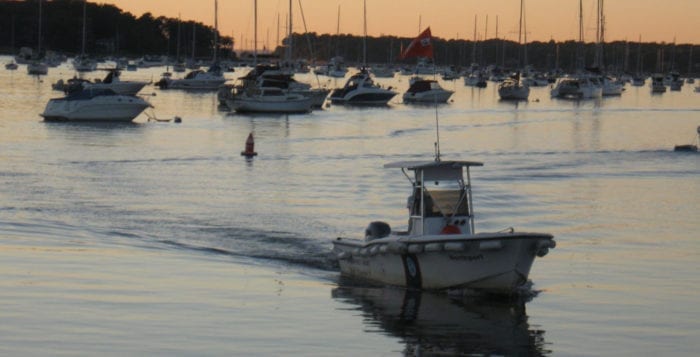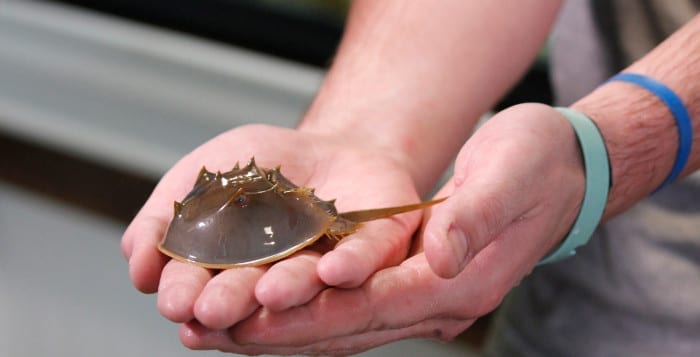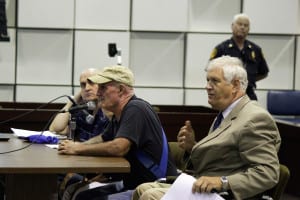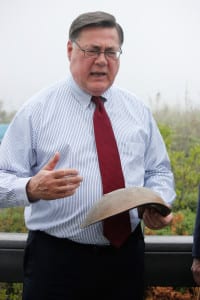Something seems fishy this black sea bass fishing season.
Local legislators, fishers and state organizations alike agree that there are issues with how black sea bass fishing is being regulated.
U.S. Sen. Chuck Schumer (D-N.Y.) called for modifications to what he said are “inflexible” and “outdated” federal regulations for black sea bass fishing, which some North Shore fisherman said are hurting their wallets because they have to wait to fish during this crucial fishing period.
Schumer said at an event in Northport last Wednesday that the bottom feeders are not being fairly managed, and the next permitted fishing period should be allowed to start in June instead of July to put people to work at harvesting the plentiful populations.
“After a slow start to the black sea bass season, mostly due to weather, our Long Island commercial fishers are ready to bounce back and access the plentiful supply of sea bass,” Schumer said at the event. “But instead they might fall flat if the feds and the state don’t throw them a line and let them do what they do best — fish.”
“They might fall flat if the feds and the state don’t throw them a line.” —Chuck Schumer
Three organizations — the Atlantic States Marine Fisheries Commission, the National Oceanic and Atmospheric Administration and the Mid-Atlantic States Marine Fisheries Commission — jointly manage black sea bass fishing, by determining the quota for sea bass each year. The New York State Department of Environmental Conservation then determines the quota distribution through the state and periods throughout the year when fishermen can fish for black sea bass.
The quota this year was set at about 189,000 pounds and the most recent period for sea bass fishing ended on May 31, with the next slated to begin on July 1.
According to the Atlantic States group, “The objectives of [management] are to reduce fishing mortality to assure overfishing does not occur, … promote compatible regulations among states and between federal and state jurisdictions…and to minimize regulations necessary to achieve the stated objectives.”
Kirby Rootes-Murdy, that commission’s senior fishery management plan coordinator, said it works to ensure that the black sea bass population stays at a safe level.
But Schumer said the break in June is only hurting fishermen.

“Below-average black sea bass catch rates … have made it so the total catch at this point of the season is well below the allowable quota limits,” Schumer said, “which is why it is critical to allow these struggling fishermen to continue catching black sea bass this month.”
Sean Mahar, the DEC director of communications, acknowledged fishing got off to a slow start, and said the DEC is committed to re-opening the season before the July 1 date, as long as it’s accurate that anglers are below quota — the agency is still investigating that.
Through May 21, only one-third of the May quota had been harvested, “with approximately 42,000 pounds [still] available on May 21,” Mahar said in an email.
“However, the harvest rate increased dramatically the last week in May, and the state is still awaiting data from the commercial fishermen and dealers that are required to submit landings and sales reports to DEC to determine the how much of the quota was actually harvested. If there is quota leftover, we will open the season again sooner than July 1.”
Mahar also said the DEC has pressed federal regulators, including the Atlantic States commission, to implement changes to improve fishery in New York, including the system for tabulating bass populations.
“The increasingly restrictive measures demanded of Northeastern states are inequitable and cause great socioeconomic harm to our anglers and related businesses,” DEC Acting Commissioner Basil Seggos said in a statement. Regulatory agencies “must revise their management strategy and not keep New York … at a competitive disadvantage while the black sea bass population continues to grow.”
“It’s a disaster for conservation and the economy.”
—James Schneider
Rootes-Murdy said these decisions on quotas are based on population projections for the species but black sea bass pose a challenge for accurate projections, as they are a hermaphroditic species, meaning they change sex from male to female.
“That aspect makes it difficult to develop a population model around,” Rootes-Murdy said.
North Shore fishermen said the break in the season is hurting their livelihood.
“It’s a disaster for conservation and the economy,” said James Schneider, a boat captain in Huntington. “It’s crushed us.”
Schneider is catching other fish in the meantime and said he has been forced to throw back black sea bass he inadvertently catches. Those die shortly after, he said, further contributing to a loss in potential profits.
Northport fishing captain Stu Paterson said he agreed that he has had to throw back many sea bass during the off-season, as they “are all over the Sound right now.”
He also questioned why Connecticut’s black sea bass season, which opened on May 1 and runs through Dec. 31, allows fishermen to start earlier than in New York, as they share a body of water.








